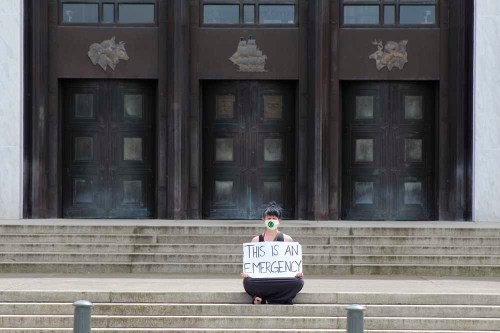Top Democrats in Oregon legislature may protect businesses, government agencies from some COVID-19 lawsuits — but not this session
Published 8:00 am Friday, June 26, 2020

- In this Tuesday, June 23, 2020, a lone masked protester sits in front of the Oregon State Capitol in Salem prior to the start of a special session of the Oregon Legislature to deal mainly with the coronavirus pandemic and police brutality.
SALEM — Democratic leaders in the Oregon Legislature have agreed to explore protecting businesses, schools, local governments and other parties from being sued if someone catches COVID-19 on their premises.
But they resisted a call from 10 House Democrats to join Republicans in doing so in this week’s special session. Instead they will set up a work group to draft legislation for a subsequent session.
Trending
House Speaker Tina Kotek said as much during a public hearing on the proposed liability protection Thursday, June 25. Republicans indicated they were willing to agree to rule changes to speed up legislative procedures as long as Kotek and other powerful Democrats ensured creation of the work group.
In an usual break from partisan unity, 10 Democratic state representatives sent a letter to Kotek and Senate President Peter Courtney on June 24 calling for more legal protections as businesses and other entities re-open in the pandemic. A large number of industry groups affiliated with business, schools, local governments and health care organizations have called for such protection.
“We want to express our disappointment over the lack of any legislation addressing the serious liability concerns that have been raised by health care providers, local governments, schools, nonprofits and businesses who fear the lawsuits they might face over the COVID-19 pandemic,” the letter said. “We are hearing from entities across the spectrum that one of their biggest concerns right now is the threat they are facing from COVID-19 lawsuits.”
The issue of partial immunity from COVID-19-related lawsuits has played out across the country and within Congress as the nation’s economy slowly reopens. A wide array of industries have raised concerns that they could be swamped by a raft of lawsuits, potentially sinking under the weight of legal bills. In response to those concerns, a growing number of states have taken up protections.
Opponents of liability protections say they are largely unnecessary since it’s extremely hard to definitively prove a person contracted COVID-19 from a specific place. But they warn that blanket liability protections could disincentivize employers and others from taking appropriate steps to guard against the spread of COVID-19.
“What we’re worried about is, will they pass something that impacts the people who’ve had loved ones harmed in nursing homes?” said Arthur Towers, a lobbyist for the Oregon Trial Lawyers Association. “That’s at the core of this issue. Are we going to fail to hold accountable the food processing plants in which so many people have been exposed?”
Trending
Labor unions, worried about employee protections, have also voiced concerns.
While it’s unclear what any liability protections might ultimately look like in Oregon, an amendment proposed by Rep Caddie McKeown, D-Coos Bay, offered an idea.
The amendment was being closely watched by lobbyists on both sides before Kotek announced it was dead. It would have ensured “a person is not liable for damages arising out of acts or omissions” that nonetheless complied with state guidance around COVID-19. The proposal would not have offered protections for “gross negligence or reckless, wanton or intentional misconduct” and protections would expire with Gov. Kate Brown’s state of emergency.
At the June 25 hearing, McKeown and other lawmakers spoke forcefully for the amendment, saying it would ensure that schools, businesses and other entities can operate without the worry of frivolous litigation.









